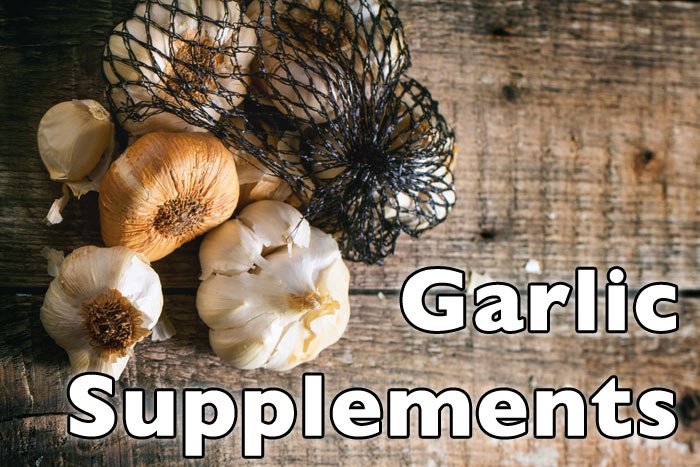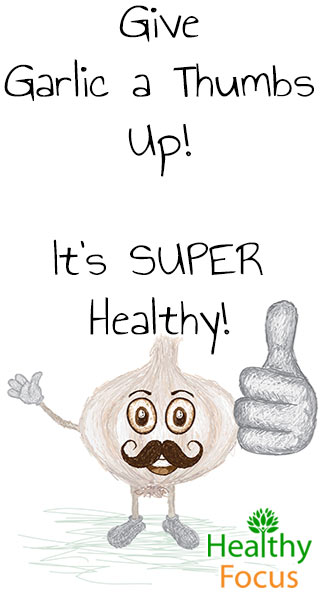Last Updated on January 25, 2017 by Marc Seward
So What Makes Garlic so Good for You?
It is not everybody’s cup of tea but I absolutely adore garlic and use it extensively in the kitchen. The good news for garlic lovers is that it not only tastes great but it is really good for you too. There is historical evidence that garlic has been used for medicinal purposes for thousands of years.
The ancient Egyptians, Greeks and Babylonians all made use of its amazing natural properties. Ongoing research continues to illustrate just how much garlic can do for you. It has benefits ranging from heart health to boosting the immune system and it may even help you to live longer.
Garlic Properties and Nutritional Facts
Allicin content
Many of the therapeutic benefits of garlic come from a powerful chemical compound known as allicin which is also responsible for garlic’s unique fragrance.
When we eat garlic or garlic extract, allicin enters your body via the digestive system and is then transported throughout the body where it gets to work in numerous beneficial ways which will be discussed later in the article.
Low in calories and nutritious
Garlic is very low in calories but is still very nutritious.
It contains vitamins C and B6 as well as a healthy dose of manganese, selenium, calcium, copper and potassium.
Natural antioxidant content
Garlic contains powerful natural antioxidants that can benefit our health in numerous ways. Antioxidants protect us against illnesses caused by oxidative stress and can even reverse or delay some of the signs of aging.
Garlic Extract supplements
Fresh garlic is a delicious and effective way of getting the most from your garlic. However, for the sake of convenience and also for those who do not like garlic, there is an alternative.
Garlic is available in extracted capsule form containing powdered garlic. A number of the recent scientific studies have focused on aged garlic extract which has even more powerful benefits.
The Benefits of Garlic Extract
Garlic and Heart health
Garlic is very good for the heart. There has been a considerable amount of research regarding its ability to reduce cholesterol and blood pressure as well as its ability to prevent atherosclerosis which is a build-up of plaque in the heart’s arteries that can lead to stroke and heart attack.
1) Blood pressure
Several studies have demonstrated that garlic extract can significantly lower blood pressure in people suffering from hypertension. (1,2).
One study published in 2013 actually showed that that garlic extract taken at doses ranging from 600 to 1500 mg was equally as effective as a commonly prescribed blood pressure medication called Atenolol (3)
The doses used in these experiments was fairly high and in order to get the equivalent amount of allicin from fresh garlic, you would have to consume at least 4 cloves of garlic each day.
2) Cholesterol
Another way that garlic extract and fresh garlic itself can benefit our hearts is by reducing both LDL and total cholesterol levels. Several studies have shown that garlic extract can reduce cholesterol by between 10 and 15%. (4,5)
These results have led researchers to believe that garlic extract could be used as a natural treatment for people with high cholesterol.
3) Atherosclerosis
Recent studies have demonstrated that garlic extract more specifically aged garlic extract can reverse the damage caused by the arterial build-up of plaque called atherosclerosis.
One such study published in the Journal of Nutrition involved 55 patients with metabolic syndrome and varying degrees of plaque build-up in the arteries.
After being treated with 2400 mg of aged garlic extract each day for a year patients experienced significant improvements including reduced plaque levels and slower progression. (6)
4) Colds
There is good news for people who suffer from annoying and debilitating seasonal colds. According to research garlic can prevent colds and help alleviate the symptoms more quickly.
In one trial 146 volunteers were treated with garlic extract or a placebo for 3 months between November and February. Those given the garlic extract suffered far fewer colds than the placebo group and also reported fewer days of illness. (7)
5) Cancer
Garlic and its extract might help boost the immune system enabling it to protect itself against cancer and other diseases. In vitro studies have indicated that garlic can destroy cancer cells while population studies show those who eat garlic are less at risk of stomach and colon cancer. (8)
One study involving 50 patients with inoperable cancer found that their immune systems improved after taking aged garlic extract for a period of 6 months. (9)
6) Weight loss
Don’t expect dramatic improvements or fast gains but there is some evidence that garlic extract can help people to lose weight and reduce their BMI.
One study published in 2012 demonstrated that 80 mg of aged garlic extract a day helped participants to lose weight over a 12-week period.
Before you get too excited, it should be noted that the weight loss was very small and equated to only half a pound a week for the duration of the study. (10)
7) Improved athletic performance
According to historians, garlic was actually used in ancient Greece and Egypt to enhance the work efforts of laborers.
It is possible that garlic extract can help improve energy levels and athletic performance but the results of research has been mixed.
One study showed that garlic improved the exercise capacity of subjects with heart disease while another study using professional cyclists showed no improvements. (11,12)
8) Detoxification
Garlic extract may help your body to get rid of harmful toxins. One study analyzed the effects of high doses of garlic extract with high amounts of allicin on toxicity caused by heavy metals in employees of a car battery factory.
Taking garlic extract reduced the levels of toxins in the blood by around 19% and participants also experienced fewer symptoms related to their work including headaches and improved blood pressure. (13)
9) Antioxidants
Antioxidants are very important to ensure good health and to protect our bodies from the oxidative damaged caused by harmful free radicals. Oxidative stress is responsible for a variety of serious diseases and also speeds up the aging process.
There is evidence that garlic extract can help reverse this damage and protect the body form oxidative stress.
Research suggests that these antioxidant properties may protect the brain from degenerative diseases such as dementia and Alzheimer’s disease. (14)
10) Prostate issues
Some preliminary studies have demonstrated that garlic extract could benefit men suffering from enlarged prostate.
One study showed that garlic extract helped reduce the size of the prostate as well as reducing associated symptoms like urinary problems. (15)
While this research is promising, more studies are necessary to see whether garlic can really help treat men with this very common complaint.
Available Forms of Garlic Extract
Garlic extract supplements are made with dried garlic, garlic oil or aged garlic and all are readily available these days. Make sure that you read the labels as each product will vary in terms of its active ingredients like allicin.
Garlic Side Effects and Precautions
There are no serious side effects associated with garlic extract and it is regarded as generally safe.
Possible minor side effects include bloating, body odor, upset stomach and bad breath.
Because garlic can thin the blood, it should not be taken with blood thinning medications or in the weeks before surgery.
Like any herbal remedy, there are always possible risks so check with your doctor if you have any concerns.
(1) http://www.ncbi.nlm.nih.gov/pubmed/16335787
(2) http://www.ncbi.nlm.nih.gov/pubmed/20594781
(3) http://www.ncbi.nlm.nih.gov/pubmed/24035939
(4) http://www.ncbi.nlm.nih.gov/pubmed/8169881
(5) http://www.ncbi.nlm.nih.gov/pubmed/23590705
(6) http://jn.nutrition.org/content/early/2016/01/13/jn.114.202424.short?rss=1&related-urls=yes&legid=nutrition;jn.114.202424v1
(7) http://www.ncbi.nlm.nih.gov/pubmed/22419312
(8) http://www.ncbi.nlm.nih.gov/pubmed/21269259
(9) http://www.ncbi.nlm.nih.gov/pubmed/16484572
(10) http://www.ncbi.nlm.nih.gov/pmc/articles/PMC3395788/
(11) http://www.ncbi.nlm.nih.gov/pubmed/15881870
(12) http://www.ncbi.nlm.nih.gov/pubmed/23713527
(13) http://www.ncbi.nlm.nih.gov/pubmed/22151785
(14) http://www.ncbi.nlm.nih.gov/pubmed/11238807


Leave a Reply
You must be logged in to post a comment.